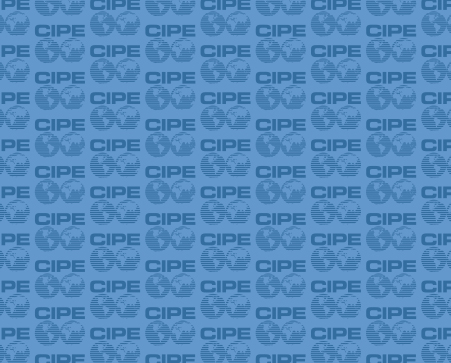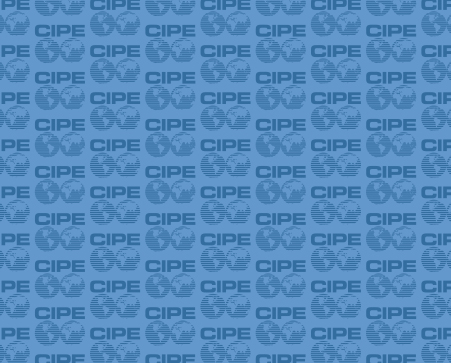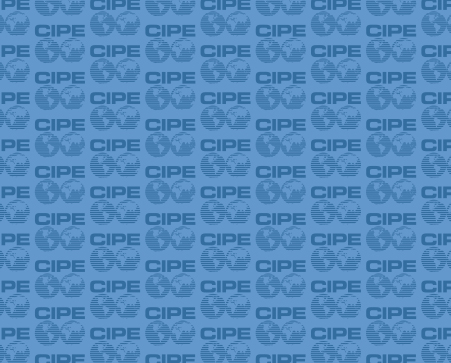
“We hear a lot about Syria— we hear the narrative of the Syrian government, we hear the narrative of ISIS, we hear the narrative of some of the opposition groups, but we don’t usually hear from the private sector, about what’s going on.”
With this introduction, CIPE Regional Director for the Middle East and North Africa Abdulwahab Alkebsi opened a panel discussion on May 21 co-hosted by CIPE and the Stimson Center entitled “A Way Forward for a Viable Syria: An Insider Perspective from the Private Sector and Civil Society.” The panel featured Chairman on CIPE partner, the Syrian Economic Forum (SEF) Ayman Tabbaa, President and Chief Executive Officer of the Stimon Center Ellen Laipson, and Middle East Fellow at the Stimson Center Geneive Abdo. The panelists discussed the role of democrats from the private sector and civil society in reshaping Syria and countering extremism.
Tabbaa spoke of SEF’s role as the first independent economic think tank in Syria working to change the trajectory of the conflict and rebuild a better Syria for the future. “We have to go back to the roots of this conflict,” he told the audience. Under the regime of Bashar Al Assad, citizens are oppressed and disenfranchised— they lack opportunity for meaningful political and economic participation. But after four years of war, people are wondering what it means to be a Syrian anymore. It is crucial, in this context, to redefine the social contract and the relationship between the citizen and state. As a think tank, SEF is playing a leading role in doing so.
“…after four years of war, people are wondering what it means to be a Syrian anymore.”
Syrians are looking for democratic alternatives to the forces tearing the country apart. Every day we see news about atrocities and violence in Syria. Much of the media focuses on sectarian violence and ISIS-created mayhem. But, even with the chaos and human suffering, Tabbaa offered signs of hope through examples of SEF’s work during the conflict.
He spoke about the recent memorandum of understanding (MOU) that SEF signed with the Ministry in Local Administration of the Syrian Interim Government (SIG). SEF has a network of liaisons inside Syria who provide the SIG and Local Councils with economic data, analysis, and recommendations. Providing this on-the-ground information to decision-makers supports improvement of local governance and enhances the democratic legitimacy of the Councils
Another SEF project helps Syrian youth develop solutions to the challenges in their communities through civic education. SEF has provided 600 young Syrian high school graduates with training in entrepreneurship, leadership, and civic skills. The course offers an alternative to the regime’s propaganda and the empty promises of extremist ideology.

Tabbaa recounted the day a businessman from Aleppo—Syria’s industrial heartland—came to him distraught because a bomb dropped by the regime hit his factory and destroyed the machines in which he had invested substantial sums. Many other businesspeople had similar stories, as SEF discovered by conducting a survey of over 1,000 factories in the northeast of Syria (a two part report). The statistics were bleak—88.7 percent of factory workers were out of work; 82.4 percent of factory owners faced danger of artillery fire; 62.3 percent of factories faced danger of aerial bombardment. Rather than wait for Syria’s industry to face further destruction, SEF searched for solutions. It advocated with the Turkish Government and other stakeholders to open up to Syrian investment the free economic zone in Gaziantep, Turkey, which was at the time only operating at one third capacity. The first two factories will be moved from Aleppo in the coming weeks. Other factories are preparing to follow their lead. One day, the businesspeople hope to reopen their factories back in Syria and rebuild the country. But for now, they will remain safe and productive.
This type of private sector-led economic activity is a prerequisite to tackling the long-term trauma of Syria’s war. The UN estimates that it will take the economy over 30 years to return to pre-war levels. Syria’s 2013 GDP dropped by 20.6 percent; inflation increased by 68 percent; foreign trade volume has decreased by 95 percent; and 57 percent of the population is unemployed, with 7.9 million people living below the poverty line. Syria’s future requires private sector solutions and the creativity of entrepreneurs for reconstruction and employment generation. The good news is that the Syrian people have retained their entrepreneurial spirit. Tabbaa spoke of hundreds of Syrian restaurant owners opening franchises in Turkey, Dubai, and Jordan. In Turkey, now you will see newspapers with business advertisements all in Arabic. It is the small and medium businesses like the ones opening in Turkey and across the region—not the elite crony capitalists that dominated the economy under the Assad regime—that are key to economic growth and recovery for Syria.

Ellen Laipson of the Stimson Center described these business relations in the context of regional economic integration. She spoke of applying to the Middle East the big ideas of the Marshall Plan, which the United States launched after World War II to rebuild economic activity in a devastated Europe. The Marshall Plan promoted private sector development and entrepreneurship alongside intraregional economic cooperation to achieve greater economies of scale and interdependence. Formal regional economic integration remains low in the Middle East after the Arab Spring.
Laipson also pointed out that, paradoxically, the turbulence of the Syrian crisis has formed a type of informal regional economic integration that could serve as a precursor to more ambitious schemes in the future. Rather than top-down integration, the conflict-driven migration has precipitated a bottom-up integration driven by practical requirements and market forces. As she notes in her Stimson Center and George C. Marshall Foundation report Revisiting Marshall: Private Sector Development in the Middle East, “While far short of formal government-to-government planned integration, it may be a more practical approach to integration, and suggests more agile, adaptive polices to achieve mutually beneficial economic activity.” The private sector activity that is happening naturally and spontaneously may open up markets and lead to long-term, positive economic effects.
Economic growth and development can also have positive effects for regional security. Geneive Abdo stated that while she did not subscribe to the theory that extremism is a result of economic conditions, she does feel that economic development can serve as an effective counternarrative in terms of curbing extremism once it develops. ISIS has an appeal because it offers resources such as money and employment. Economic development with the involvement of the private sector is therefore key to offering an alternative to extremism. Tabbaa spoke of the young Syrians that joined the Free Syrian Army during the beginning of the revolution with a $100 per month salary. Then Jabhat Al-Nusra offered $150 per month. Then ISIS offered $400 per month, plus a food basket, laptop, and phone. While economic drivers may not be the only factor, they constitute an important part of the picture. Even within Islamist groups, businesspeople can act as a moderating force. For example, Abdo spoke of meeting with entrepreneurs from the Muslim Brotherhood who recognized the potential for economic development as an alternative to political fragmentation.
In closing, Alkebsi pointed out that the business community tends to act as an integrative force capable of working across sectarian and political lines. He noted, “The existing political structures are not integrative in nature; meanwhile our (CIPE’s) partners in the business community are looking for ways to work together because they want to make money!” In the midst of the devastation caused by the Syrian civil war, it is crucial to work with the business sector as a moderate, unifying constituency offering a democratic alternative to competing forms of tyranny in the country. Organizations like SEF give that constituency a voice.
Watch the full discussion here.
Peako Jenkins is a CIPE Program Assistant for Middle East and North Africa
Published Date: June 01, 2015